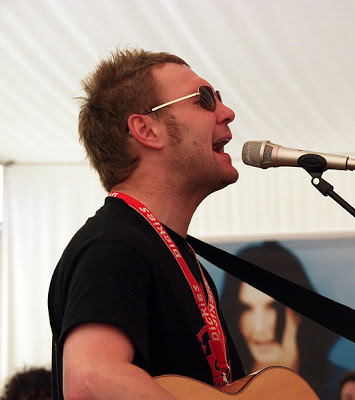
Singer-songwriter speaks out against music used in torture
By Andy Worthington
Singer-songwriter David Gray has taken a brave stand by complaining about the use of his music as torture by the US military in “War on Terror” prisons in Guantánamo, in Iraq, and in secret prisons run by the CIA.
On BBC Radio 4’s The World Tonight, singer-songwriter David Gray spoke out against the use of music as torture by the US military.
Gray’s chart-topping song Babylon, played repeatedly at ear-piercing volume, is one of dozens of songs, by artists including Eminem, Bruce Springsteen, Rage Against the Machine and Britney Spears, that has been used by the US military as part of a package of “enhanced interrogation techniques,” intended to “break” prisoners held without charge or trial in the “War on Terror” — in Guantánamo, in Iraq, and in secret prisons run by the CIA.
As the Guardian recently explained, the use of Babylon first came to light “after Haj Ali, the hooded man in the notorious Abu Ghraib photographs, told of being stripped, handcuffed and forced to listen to a looped sample of Babylon, at a volume so high he feared that his head would burst.”
Complaining that the only part of the torture music story that gets noticed is its “novelty aspect” — which he compared to “Guantánamo[‘s] Greatest Hits” — Gray delivered a powerful indictment of the misappropriation of his and other artists’ music.
“What we’re talking about here is people in a darkened room, physically inhibited by handcuffs, bags over their heads and music blaring at them for 24 hours a day, seven days a week,” he told the BBC. “That is torture. That is nothing but torture. It doesn’t matter what the music is — it could be Tchaikovsky’s finest or it could be Barney the Dinosaur. It really doesn’t matter, it’s going to drive you completely nuts.” He added, “No-one wants to even think about it or discuss the fact that we’ve gone above and beyond all legal process and we’re torturing people.”
This is the second time that Gray has spoken out about the use of music as torture. Two weeks ago, he explained, “The moral niceties of whether they’re using my song or not are totally irrelevant. We are thinking below the level of the people we’re supposed to oppose, and it goes against our entire history and everything we claim to represent. It’s disgusting, really. Anything that draws attention to the scale of the horror and how low we’ve sunk is a good thing.”
Reprieve, the legal action charity that represents over 30 prisoners at Guantánamo, recently launched an initiative, Pull the Plug on Torture Music, encouraging artists to sign up to prevent the use of their music as part of the US military’s torture techniques, to insert a clause in their contracts preventing the misuse of their music, and, in general, to raise awareness of the issue by spreading the word and playing anti-torture gigs.
Others who have signed up for Reprieve’s initiative include Massive Attack (who recently hosted a series of Reprieve events at their Meltdown festival at London’s Southbank Centre), Alabama 3, Elbow, the Magic Numbers, Seize the Day, and Tom Morello of Rage Against the Machine, who told Spin magazine in 2006, “The fact that our music has been co-opted in this barbaric way is really disgusting. If you’re at all familiar with ideological teachings of the band and its support for human rights, that’s really hard to stand.”
Whether you like David Gray’s music or not should be irrelevant. He understands what’s really going on with the use of music as torture, and he’s been brave enough to raise his head above the parapet, which is not something that musicians are always prepared to do.
Andy is the author of “The Guantánamo Files: The Stories of the 774 Detainees in America’s Illegal Prison” (published by Pluto Press/the University of Michigan Press).
Source. / DC Indymedia / Posted July 3, 2008
The Rag Blog


















In torture rooms of the Chilean and Argentinean military dictatorships of the 70s, loud dance music of the time was played to help drown out the screams of the victims, stuff like Parliament-Funkadelic, KC and the Sunshine Band, Ohio Players, etc. I don’t recall reading that it was considered part of the torture, but I always thought that those who survived would be reminded of their tortures every time they heard top-40 radio. Of course, many of the Latin American torturers of that time were trained by Americans, so the use of inescapably popular music may have been part of a deliberate strategy of ongoing psychological destruction.